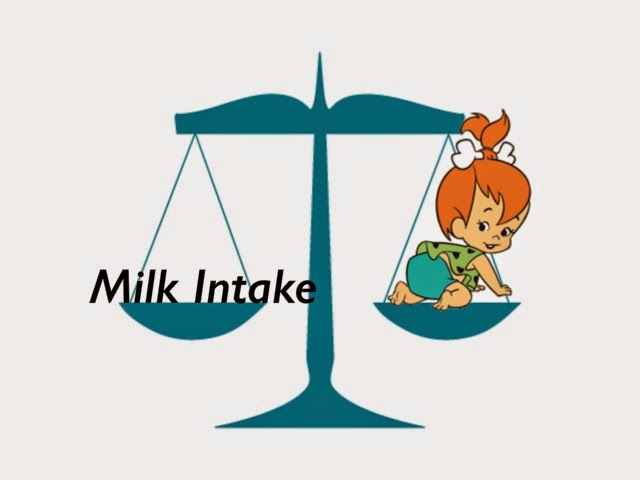I am an IBCLC (International Board Certified Lactation Consultant) in private practice in Northern Ireland and a La Leche League Leader with La Leche League of Ireland
My baby is always hungry - maybe I don't have enough milk?
This is the last blog in our series about why mums in Northern Ireland give up breastfeeding within the first week of birth. Feeling like she doesn't have enough milk is the reason that 17% of mums give up during that time, and this worry comes up again and again over the early weeks. In most cases this is just due to our lack of understanding about normal baby behaviour.
Supply and Demand

As mums, our bodies are designed to produce milk. We begin to produce colostrum as early as week 16 of pregnancy. Colostrum is produced in small quantities - perfect for our small babies. A newborn's stomach capacity is only around a teaspoon, so it makes perfect sense that we should produce small quantities during pregnancy (so that it is ready as soon as your baby is born), and for the first few days.
After we birth our baby and placenta, progesterone levels in the body drastically drop. This drop triggers the onset of larger volume milk production within a few days. This is hormonally controlled. However you plan on feeding your baby, increased milk production will begin within a few days of birth and your breasts will fill with milk for your baby. Along with this change comes a change from milk production being hormonally controlled to being controlled by milk removal. The more milk your baby drinks, the more milk you will produce and as long as you feed your baby on cue you will make as much as your baby needs.
How culture undermines us

The modern world is a difficult place for babies. Our babies are born incredibly immature, with brains only 25% of adult size (this is proportionally much smaller than other primates). Our babies have basic reflexes for survival, but are reliant on mum's body to provide a lot of their nervous system organisation and stability. The neonatologist Nils Bergman believes that a baby should be in continuous contact with mum for the first 8 weeks. When not in contact with mum his research shows that a baby becomes stressed, and his temperature and heart rate drops. Babies are designed to be held on mum's body, in her arms or in a sling. This is a lot easier and more natural than it may initially sound.
Then comes the specificity of human milk. Depending on the care that their infant needs, mammals can be divided into 4 main groups and these groupings can be seen reflected in their milk. These groups are:
- Cache mammals e.g. Rabbit - mother goes out to eat and returns to the nest every 12 hrs. Milk high in fat and protein to sustain the infants for this period
- Nest mammals e.g. Dog/cat - infant is relatively immature and needs to be with the litter. Mum returns to feed 4hrly approximately. Milk lower in fat and protein
- Follow mammals e.g. Cow - the infant is capable of following the mother shortly after birth and feeds approximately 2hrly. Milk is lower in fat and protein
- Carry mammals e.g. Primates /Humans - these are the most immature mammals. Designed to be carried on mum's body and fed very frequently. This milk is lowest in fat and protein as baby feeds frequently and is high in lactose to help with rapid brain growth.
Here lies the problem. It is a problem of expectations. If you are pregnant now have you considered that your baby will need to be held and fed so frequently? For those of you who have their babies in their arms already - has the reality been anything like your expectations? If we're honest I think most of us get a huge shock. In this society our expectations of a baby are that they feed 3 hrly, and will sleep in between, or be alert and quiet so that mum can get on with other things. This is not reality for most mums and young babies. Young babies need to feed frequently. They have tiny tummies, they are growing faster than they will ever grow again. They are learning to feed and use jaw and tongue muscles that have never been used as intensively before. Using new muscles is tiring so sometimes our babies need to feed a little and then rest, feed and rest. That can make feeding a little and often process. Think of it as a Couch to 5K for your baby. In a few weeks his jaw and tongue muscles will become stronger and it is the practice and strengthening of the muscles used during breastfeeding that promotes normal facial development and means that he will be less likely to need orthodontics later.
Human milk is digested easily and quickly (a good thing for the digestive system and for growth of baby) and it is common for many breastfeed babies to feed every 90mins. In fact Nils Bergman believes from his research that feeding every 90 minutes is normal and optimal for a newborn. For a mum who expects 3 hrly feeding this can be a total shock, and baby seeming to be hungry again so quickly can leave her questioning whether she has enough milk. This is truely a case of Stone Age babies in a Space Age society which has lost contact with basic needs of our babies. Sometimes I wonder why we have such different ideas for our young than for ourselves. It has been suggested that adults eat or drink every 90 mins - a glass of water, our ubiquitous wee cups of tea, a piece of toast here and there, maybe a biscuit or a bag or crisps between meals. We are trying to maintain weight usually - or many of us trying to lose weight. Of course a baby who is trying to double his weight in the first 6 months needs to eat more frequently!

Where did our unrealistic expectations come from?
Partly they have come through older childrearing recommendations. In our parents and grandparents generations it was recommended to feed on schedules, to time breastfeeds. These recommendations came at a time when neurological development simply wasn't known or understood, and neither was milk production. We know better now - and when we know better, we do better for ourselves and for our babies!
Even more recent recommendations can be confusing. You may have been told in your antenatal class that babies feed 8-12 times a day. I think this is probably where the idea of a breastfed baby feeding 2-3 hrly comes from. There are 2 confusing issues that I see for mums being given this information:
- The baby friendly info suggests a baby should feed 8-12 times a day. This often gets translated as telling you that you should feed your baby 3hrly, but that is not what the recommendation is saying. Think about the purpose of this recommendation. The Baby Friendly Initiative is there for our healthcare professionals in order to make sure that our babies grow and thrive. It is saying that they need to ensure that a baby feeds at least 8-12 times a day. It says a baby should feed more than 8 times a day. 8 times is a minimum! It is not saying you should not feed more than 12 times. It is saying you should feed no less than 8-12 times. In the early days helping baby to start gaining weight is key and so putting baby to the breast early and often is important. A baby feeding 12 times a day is normal! It is not an indication of low supply.
- Babies do not feed in a defined way in regular intervals. Do any of us? Do you eat at exactly the same times as your friend/partner? Do you eat the same amounts and take the same time over a meal? What constitutes a feed anyway? A baby may feed for a little and then fall asleep for 20 minutes, then wake and begin rooting again. Is that a 2nd feed or is that the same feed? What about when baby seems to feed for a couple of hours - feeding and resting, feeding and resting? Is that one feed of 2 hrs or was it more than one? When does one feed end and another start? For most newborns feeding, winding, nappy changing and feeding again can seem like it is a continual process. Then there are the babies who feed really frequently during the day and take a longer stretch at night. The idea of counting 8-12 feeds is not only almost impossible, it is stress provoking for mums. If there is a figure in your head, it is extremely hard not to either try to fit that figure or to worry about not fitting that figure.
The easiest way to transition into a stress free breastfeeding relationship is to follow your baby and put him to the breast as often as he cues. It is also just as helpful to put your baby to the breast any time you feel your breasts full to relieve any discomfort. By responding to your baby rather than the clock or a feed counter you ensure a healthy milk supply and a happy content baby. That means you can enjoy your frequent nursings and really feel the joy of responding to your baby's needs and seeing him grow and be nourished at your breast.
Signs that everything is on track.

Having a new baby can be an incredible shock, particularly a first baby. A newborn needs us intensely. He needs to feed very frequently, and that often brings the comment from others, "Is he feeding again? He must be hungry". Even when we have all the research though, these comments can plant the little seed of doubt in a new mum.
Some mums offer a bottle of expressed milk when doubt creeps in and then become disappointed when they find that their baby drinks a bottle after being at the breast. Sometimes this is mistakenly seen as proof that their baby is still hungry and not getting enough at the breast. The bottle feeding position that we commonly see is baby lying back and the bottle pointing down into his mouth. In this position the bottle drips milk constantly, even a newborn teat. The baby cannot stop the flow. As milk hits the back of the baby's throat it triggers the swallow reflex. The baby has to drink. It doesn't mean he is still hungry.
Some mums express milk and then worry when they don't get the amount they expected. Again this is not any indication of your supply. Pumps do not work like a baby and they never remove as much milk as a baby. The way we respond to plastic and electric is very different to our hormonal response to our baby.
Some mums offer formula and if their baby seems to go longer between feeds they take this as an indication of an issue with their milk. Remember that formula is made from the milk of a follow mammal. The protein level is higher. This is appropriate for a calf who needs to double weight gain in 40 days but not for a human who needs to concentrate on brain development and slower physical growth. This is not an indication of a milk supply issue, it is an indication that formula is harder to digest and that the baby's behaviour has become abnormal to deal with it. In effect baby shuts down in order to divert energy to digestion. It's like falling asleep after a massive Turkey and ham Christmas dinner - which isn't something you'd recommend eating every day, and baby is missing all that more alert learning time!
When in doubt, look at the signs of milk intake. Does your baby come off the breast happy and content? Are you seeing enough wet and dirty nappies? Finally the absolute sure sign - is your baby growing and gaining weight? If weight gain is an issue look for good breastfeeding support to turn it around. If you are seeing these signs then you can reassure yourself that everything is going ok, and these frequent feeds will space out as your baby matures.
Trust your baby and trust your body. It is ok for your baby to feed this frequently in the early days. It won't always be this way. As your baby grows and matures he will start taking more defined feeds with space between them - more like the cultural expectations set us up for. In the very early weeks most babies spend much of their time at home, feeding, winding, pooping and growing. Right now just relax and melt into those feeds. Enjoy your baby at your Breast and trust your body. Your body grew your baby from a single cell into a beautiful bundle of joy. It can continue to provide everything your baby needs.
If you have any questions about a consultation or would like to arrange to meet, please get in touch.
Important Information
All material on this website is provided for educational purposes only. Online information cannot replace an in-person consultation with a qualified, independent International Board Certified Lactation Consultant (IBCLC) or your health care provider. If you are concerned about your health, or that of your child, consult with your health care provider regarding the advisability of any opinions or recommendations with respect to your individual situation.
